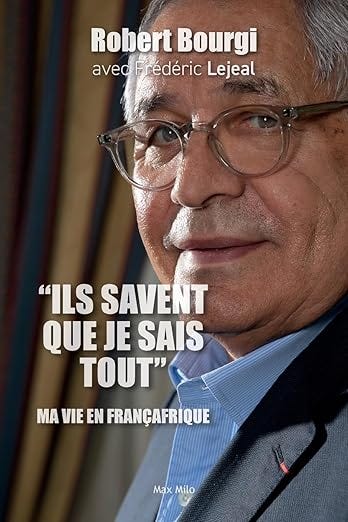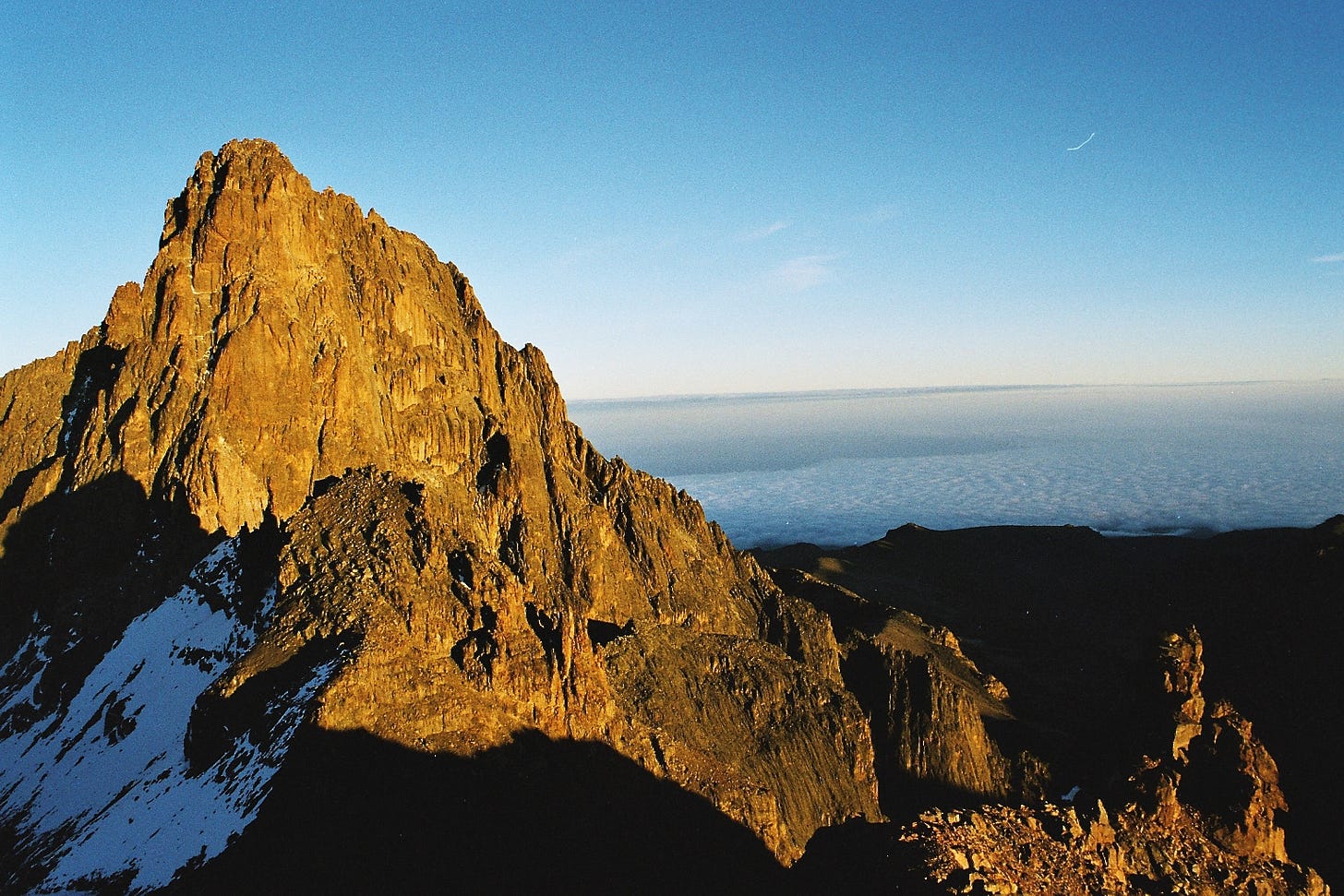🔅 France & Africa’s Cozy (And Shady) Relationship 💰
From Cozy Colonial Ties to Grandpa's Tough Love Language Lessons, We've Got It All!
Image of the Day
Good Morning from Kinshasa, DRC

Spotlight Stories
Françafrique: Insights on France & Africa’s Cozy (And Shady) Relationship
Françafrique: the term used to describe the cozy (and sometimes shady) relationship between France and its former African colonies.
And at the center of this tangled web was a man named Robert Bourgi, a Lebanese-Senegalese fixer who rubbed shoulders with African leaders and French politicians alike.
In his recently published memoirs, "They know that I know it all - My life in Françafrique," Bourgi spills the beans on the money-grabbing and mutual dependence that linked French and African politics for decades.
And boy, does he have some juicy stories to tell!
Take, for instance, the time he was waiting to see Gabonese President Omar Bongo in 1988. Bourgi was there to collect, from an African leader, funds for Jacques Chirac's presidential campaign(!), but who should walk in but Roland Dumas, right-hand man of Chirac's rival, François Mitterrand.
Awkward!
Dumas, claiming seniority, went in first. When he emerged, he quipped to Bourgi, "Don't worry, there's still a bit left!"
But that's just the tip of the iceberg: According to Bourgi, it was routine for French political parties to receive financing from their former African colonies. In the 1995 and 2002 presidential elections, he says around $10 million was given by African leaders to support Chirac's campaigns.
And the money didn't always arrive in the most conventional ways. In 2002, a representative of Burkina Faso's leader Blaise Compaoré showed up in Paris with a large sum of cash hidden in djembe drums. When opened at the Elysée Palace, a rain of small-denomination banknotes fell out. "Typical Blaise," Chirac reportedly said.
Handling all that cash wasn't easy either. Bourgi once resorted to taking down one of his daughter's posters to wrap the money in.
Of course, when these allegations first surfaced in 2011, they were met with denials from officials in Burkina Faso and elsewhere. Chirac and his then chief of staff also strenuously denied the claims. A preliminary investigation was opened but later dropped because the payments were considered too long ago.
But for African leaders at the time, Bourgi says, it was just business as usual. Giving large sums of money was a way of establishing trust and support, and they did it among themselves too.
Sounds like Bourgi’s memoir is a must-read.
South Africa's Private Security Boom: A Symptom of a Struggling State

As darkness falls on the streets of Johannesburg's richest district, the night is alive with the flash of strobe lights from high-powered vehicles patrolling the area. But these aren't your average cop cars – they're the mobile offices of South Africa's booming private security industry.
With a sky-high murder rate and a spate of ransom kidnappings targeting liquid businesses, it's no wonder that those who can afford it are hiring their own personal armies.
South Africa now boasts a staggering 2.7 million registered private security personnel: that's more than five times the number in 2017.
To put that in perspective, the country's national police force is a mere 150,000 strong.
According to analysts, this ratio makes South Africa an anomaly and reflects a decline in the state's monopoly over law enforcement.
The rise of private security has led to some surreal scenes in South Africa's wealthiest neighborhoods:
Schools have had to rethink drop-off and pick-up as the children of the wealthy move with added security, while luxury vehicles driven by bankers and executives are stripped and rebuilt with bullet-resistant armor.
In Johannesburg, it's now more common to see entourages of men with assault rifles in shopping centers and other public spaces keeping a close watch on their ultra-wealthy clients.
Black luxury vehicles with white strobe lights move in tight convoys, like a scene straight out of a Hollywood action movie.
As Yaseen Theba, a director at Vision Tactical, put it:
"We are living in a time when certain people have got more bodyguards than the head of state, which is shocking. They are walking around with private armies."
The deterioration reflects the overall state of the country: The economy is barely growing, unemployment is at a record high, and many districts go weeks without water.
The national power company has been plagued by outages for years, and the collapse of the rail network has resulted in a loss of much-needed revenue for the government.
The new minister of police, Senzo Mchunu, has promised to allocate more than half the police budget to getting more officers onto the streets, including 10,000 new recruits.
But with an average of 50 detectives a month leaving the South African Police Service since October 2023, many of whom are believed to have joined private security, it's an uphill battle.
The Grandpa Method: How Tough Love and Skipped Meals Saved a Language
Meet Juliana Loshiro, the 28-year-old language superhero on a mission to save her tribe's nearly extinct language, Yaakunte. And she's not letting a little thing like the United Nations declaring it dead stop her!
Loshiro is one of the few remaining fluent speakers of Yaakunte, and she's determined to give her language and culture a fighting chance. Twice a week, she transforms into Professor Loshiro, teaching a class of about 300 students – from village elders to kids – at a community center.
But why are even the older folks struggling to speak their own language?
Well, as one student explains, his grandparents passed away before they could teach him, and his Maasai mom didn't know Yaakunte either. "So we got lost," he says.
For Loshiro, saving the language is about more than just preserving a way of speaking – it's about safeguarding the culture and knowledge of the Yaaku people and their traditional home, the Mukogodo Forest. "If we lost the language, we have lost the culture, we have lost the forest," she says.
So, how do you grow a language? With a word forest, of course!
Every week, Loshiro takes her students to the forest to plant indigenous trees, tagging them with labels in both Yaakunte and English. They've already planted 10,000 seedlings and scattered 50,000 seed balls.
Loshiro learned Yaakunte from her grandfather, who raised her from age seven. His teaching method? Ten new words a day, and if she couldn't remember them the next day, no dinner for her. "There was a time I forgot three words and I slept without eating," she recalls. Grandpa Leriman did not mess around.
While some linguists are skeptical about reviving the language, Loshiro is unstoppable. She's working on a website, an app, an audio archive, and even a primary school curriculum to keep Yaakunte alive and kicking.
Her goal? To have Yaakunte spoken once again and to ensure that her own kids know their language and culture.
Food for Thought
“What is sensible today may be madness tomorrow.”
— Nigerian Proverb




